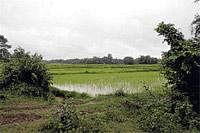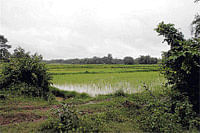

The aggressive approach of the state government towards implementing the controversial Dandavati project which was rejected by experts earlier on feasibility grounds has stirred up a hornet’s nest in Malnad. People in the Dandavati valley have been staging an indefinite dharna from February 1 even as the state government has made necessary preparations to undertake survey work at the project site.
The government has planned to construct a reservoir across the Dandavati rivulet at Marur near Sorab. A total of 1,888 acres will be submerged by the project which includes 1,426 acres of cultivable land, 113 acres of forest and four villages. It has been planned to store 1.8 tmc water in the reservoir and irrigate 17,500 acres from the same.
Water for a single crop
The government has planned to provide water for a single crop from the reservoir. Farmers who oppose the project feel that it is the height of foolishness to construct a reservoir that will result in large scale displacement and submersion to irrigate lands in Anavatti and Jade hoblis which have an annual rainfall of more than 1,000 mm. At a time when farmers have been able to harvest two crops a year with natural rainfall, where was the need to channelise water for them through canals, they ask.
Dandavati takes birth near Kuppe of Sorab taluk and flows for 55 kms before joining river Varada near Bankasana. Marur-Jedigere where the government has planned to construct a reservoir is just five kms away from Kuppe. Interestingly, the birthplace of the river will also be submerged if the reservoir is constructed near Marur-Jedigere!
The Dandavati Virodhi Horata Samiti which has launched a struggle against the project says the project is being implemented for political reasons. It questions the rationale behind irrigating dry lands by submerging fertile agricultural land and rain forest.
Chief Minister B S Yeddyurappa announced implementation of Dandavati project in 2007 after he became DyCM. The Congress and JD(S) leaders who are against the project allege that regions which will be irrigated by the project are BJP bastions.
Political blame games
Meanwhile, political games continue. Those politicians who had proposed implementation of the project in the 1990s now oppose the same. There have been flip-flops and changes in stance. If the government is so keen on irrigating the taluk, it should implement the Bythanala irrigation project which was planned in the Seventies, farmers say.
The project, which would have irrigated four districts of North and Central Karnataka, had got all sanctions during the period including financial allocation, but was dropped for political reasons. Farmers of Sorab taluk camped in Marur for a week in January 2009 when Chief Minister B S Yeddyurappa announced laying of the foundation stone for the project. Shivappa Katler, a farmer of Dandavati basin committed suicide on January 12 fearing his land would be submerged in the reservoir.
The intensity of the protest was such that the chief minister laid the foundation stone of the project at Sorab town, without visiting the project site. The funeral procession of the deceased farmer was marked by unsavoury incidents as irate farmers indulged in stone pelting and torched vehicles along the way.
Compensation has still remained a mirage for the family of the deceased farmer and police are yet to initiate a probe. Another controversy was waiting to happen when the notification was issued for survey of the project site in January 2010. Farmers have been on an indefinite protest at the project site from February 1 and have threatened to stage a Singur like protest if the administration employs coercive means.
Leader of Opposition Siddaramaiah visited the project site at Marur on February 8 and assured the farmers that the state government will be asked to withdraw the project. Janata Dal (Secular) supremo H D Deve Gowda also is slated to meet the protesting farmers in Marur-Jedigere in the third week of February.
While the state government has promised compensation for the displaced families, farmers here are in no mood to oblige. The Samiti points out that when compensation is yet to reach the families which were displaced because of the Sharavati, Chakra, Varahi, Savehaklu projects implemented in Malnad decades ago, the Dandavati farmers can’t expect a better deal.
Protesting farmers also suggest an alternative to irrigate dry lands in Sorab taluk, which has 1,473 tanks, the highest in the nation. The tanks were constructed during the rule of Vijayanagar and Keladi nayakas and are inter-linked through canals. These tanks are irrigating 20,500 hectares of land at present. Farmers suggest construction of mini barrages for Dandavati and Varada rivers which flow in the taluk.
Project history
* More than ten proposals were submitted to construct a reservoir across Dandavati river from the past 115 years and were rejected on viability and feasibility grounds.
* The proposal to construct a reservoir across the Dandavati was first mooted when the region was under British rule in 1895.
* Proposals were also submitted in 1927, 1929 and to Dewan of Mysore State in 1939.
* A survey was first conducted for the project in 1893 at a cost of Rs one lakh and the cost was reviewed after conducting preliminary survey for the second time in 1927.
* The project cost was estimated to be Rs 20 lakh in 1952-53.
* The cost was revised to Rs 30 lakh after adding the compensation to be offered to farmers.
* This was later revised to Rs 40 lakh in 1955 and Rs 173.8 lakh in 1967. The proposals were eventually rejected.